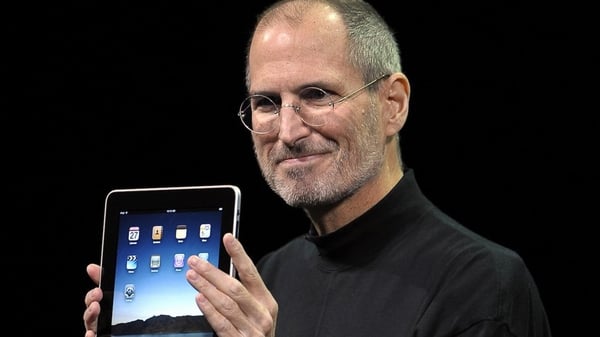Apple shares fell in Wall Street trade today in the wake of the resignation of visionary founder Steve Jobs.
Jobs resigned as chief executive last night and passed the reins to his right-hand man Tim Cook, saying he could no longer fulfil his duties, but making no mention of the poor health that has forced him to take a back seat this year.
Read more on the career of Steve Jobs here
Jobs, who fought and survived a rare form of pancreatic cancer and revolutionised the technology arena with the iPod, iPhone and iPad, is deemed the heart and soul of a company that became the most valuable in the world for a brief period this year.
'I have always said if there ever came a day when I could no longer meet my duties and expectations as Apple's CEO, I would be the first to let you know. Unfortunately, that day has come,' Jobs wrote in a brief letter announcing his resignation.
The letter and a separate statement from Apple raised more questions than it answered about Jobs' health and the future of the company. Jobs will continue as chairman at the company.
While it is unlikely that his departure as CEO will derail Apple's ambitious product-launch roadmap in the near term, there are concerns about whether the company will be as creative without its founder and visionary at the helm.
Apple's stock had dropped as much as 7% in the US after-hours trading when Jobs' departure was announced.
In the company statement, Apple co-lead director Art Levinson on behalf of the board praised Jobs' 'extraordinary vision and leadership' and said he would continue to serve the company with 'unique insights, creativity and inspiration'.
Jobs' battle with pancreatic cancer, which has stretched over several years, has been of deep concern to Apple fans, investors and the company's board. Over the past two years, even board members have confided to friends their concern that
Jobs, in his quest for privacy, was not being forthcoming with directors about the true condition of his health.
Jobs has been on medical leave since January, with his duties being filled by Cook, who was chief operating officer. The 56-year-old Jobs had briefly emerged from his medical leave in March to unveil the latest version of the iPad and later to attend a dinner hosted by US President Barack Obama for technology leaders in Silicon Valley.
But his often-gaunt appearance had sparked questions about how bad his illness was, and his ability to continue at Apple.
Cook named as new Apple CEO
In each of Jobs' three health-related absences, Cook has taken over the helm. The 50-year-old Alabama native, a former Compaq executive and an acknowledged master of supply-chain management, remains largely untested in Wall Street's view, however.
One Silicon Valley CEO, who declined to be identified because of the sensitive issues involved, said the tone of Jobs' statement indicated his health might be worse than feared.
The Apple chief has earned a reputation for commanding every aspect of operations - from day-to-day running to broad strategic decisions - suggesting he would not give up the job if he had a choice.
Brand research company Millward Brown said Apple's brand, which it values at over $153 billion, should remain intact. 'Steve Jobs resignation from Apple is sad for him as it presumably presages more illness. However he has left the Apple Brand in rude health so that the company is still poised for future growth,' global brands director Peter Walshe wrote.
'The future direction is mapped out, the successor is in place (also a designer by background), and consumers rate the brand uniquely 'creative', 'fun' and 'adventurous',' he added.
While Jobs did not give details on the state of his health, oncologists who have not treated the Apple founder said he could be facing several problems tied to his rare form of pancreatic cancer and subsequent liver transplant. Such problems include possible hormone imbalances or a recurrence of cancer that is harder to fight once the body has already been weakened.
'Steve Jobs is the most successful CEO in the US of the last 25 years,' Google chairman Eric Schmidt said in a statement. 'He uniquely combined an artist's touch and an engineer's vision to build an extraordinary company,' he added.
Nokia CEO Stephen Elop said: 'Steve Jobs is a visionary in the computing industry. We look forward to both Steve and his team having a positive impact on our industry for many years to come.'
Elop was appointed last year to lead Nokia's fightback against Apple, whose iPhone posed a challenge that the world's biggest mobile phone maker has yet to meet.
Apple previously did not have a chairman, but had two independent co-lead directors.
In his letter, which was addressed to the Apple board and the Apple community, Jobs said: 'I hereby resign as CEO of Apple. I would like to serve, if the Board sees fit, as Chairman of the Board, director and Apple employee.'

